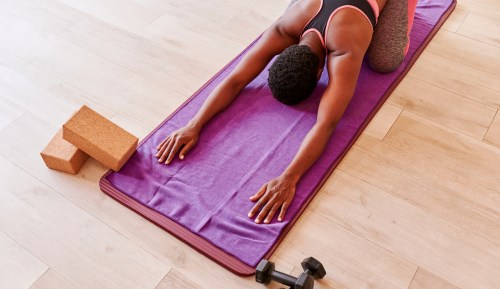Why It’s Important To Take Rest Days Even—and Especially—in January
The message you're getting internally and externally might be "go, go, go," but it's important to take rest days no matter the month.

The strength training program I signed up for on January 2 recommends doing a workout three times per week. Meanwhile, I like to run at least twice a week, and I do one workout with my trainer friend on our standing date on Tuesdays.
Experts in This Article
That leaves me only one day for rest. How am I supposed to squeeze it all in? As someone who preaches the importance of listening to your body and letting it recover, I seriously need to take my own advice this month. Even when the structure and motivation of a new year says “go, go, go,” — or, especially when those are the messages I’m getting both internally and externally—it’s important to slow down, and alternate intense workouts with rest days.
“Especially at the start of a new year when motivation is high and hustle culture is blaring, rest days are integral to mitigate burnout or simple loss of interest that comes after that new year rush,” says Tonal coach Kristina Centenari.
But the mental aspect of rest to keep us motivated isn’t the only reason we need to be pumping the brakes. Rest is actually crucial to achieving the fitness goals you might have set your sights on.
“Most people think of rest days as separate from training,” Centenari says. “But if we think of our bodies as a system, rest days are integral to your training and maintaining the function of your system as a whole.”
“If you are not resting, you are not training properly.” —Tonal coach Kristina Centenari
When we put ourselves through the “controlled stress” that is building muscles, what we’re actually doing is creating tears in the muscle fiber. In order to get stronger over time, those tears have to repair—or, as Centenari puts it, get “back to baseline.” Centenari warns against “stressing your system faster than it can repair” because that could lead to pain or injury, and undermine your goals of allowing those muscles to become stronger.
Your nervous system needs a break, too. “Training puts you in a sympathetic state, in which case your nervous system is fired up and in that ‘fight or flight’ mode,” Centenari says. “This is beneficial for training purposes. However, if you don’t allow for rest periods, your cortisol levels will rise and your nervous system will struggle to find its parasympathetic (aka relaxed) state. This can throw off your hormones, impact your sleep, alter your mood, impair your digestion—all of which are detrimental to your whole system.”
Ever tried doing a workout challenge when you’re tired, in a bad mood, or have a stomach ache? That’s not a recipe for a great outcome!
What rest looks like could be different from person to person. But overall it involves time off from exercise, while focusing on sleep, mobility, and nutrition.
I understand that feeling at the end of a day when I didn’t get an intense workout in, and the twinge of guilt. But it’s time to let that go, especially at the start of the year when we might be trying to establish good habits.
“If you are not resting, you are not training properly,” Centenari says. “If you are not training properly, you may not be setting yourself up for long-term success. Respect the rest.”
Need some rest-spiration? Try this mobility workout to oil up those joints while giving your muscles and your nervous system a little break from your harder workouts.
Sign Up for Our Daily Newsletter
Get all the latest in wellness, trends, food, fitness, beauty, and more delivered right to your inbox.
Got it, you've been added to our email list.










